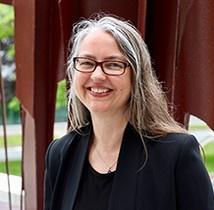
March 9, 2021
To mark the 2021 International Women’s Day themed #Choose to Challenge, Afronomicslaw.org celebrates Dr Sara Seck’s brilliant contributions to International Law. Dr Seck is an Associate Professor and Associate Dean for Research at Schulich School of Law, Dalhousie University.
“#Choose to Challenge: A challenged world is an alert world and from challenge comes change. So let's all choose to challenge.”
Afronomicslaw.org (A): Please tell us about your research.
Dr Sara Seck (SS): Many of my publications can be found on the Schulich School of Law digital commons here which briefly describes my research in this way: I am particularly interested in the relationship between international human rights law, environment, and business law, with a focus on the rights of local and Indigenous communities, and global south perspectives on sustainable development. I have researched and published extensively on home state duties and business responsibilities in the extractive industries context. More recently, I consider how lessons from this research as well as insights from feminist and relational theorists might inform approaches to environmental and climate justice.
Some examples of my earlier work on home state responsibility explicitly incorporates a TWAIL perspective (2008 Osgoode Hall Law Journal; 2011 Trade, Law & Development). My most recent publication consolidates several others that aim to develop a climate justice framework of ecologically embedded relational law that is attentive to difference and Indigenous worldviews and apply it to the responsibilities of carbon majors (Oñati Socio-Legal Series). Forthcoming April 1 (with co-editors Sumudu Atapattu and Carmen Gonzalez, and many inspiring contributors) is: Cambridge Handbook on Environmental Justice and Sustainable Development. Projects in the works touch on the human rights/climate/oceans interface, climate loss and damage, ethical responsibilities of lawyers advising businesses, and more.
A: How did you become interested in academia and international law?
SS: Before studying law, I studied western classical music and chamber music performance, then freelanced as a musician for six years. I became fascinated with the interactions between different world music traditions and western classical traditions, which are each internally coherent and beautiful, yet are based on fundamentally different culturally informed building blocks. I also experienced the challenges of life in a rich country as an informal sector ‘worker’ where laws are too often unthinkingly designed to exclude you from basic entitlements and devalue your contributions. In curious ways these experiences inform how I think about international law and justice.
A: What informs your scholarly interventions?
SS: A desire to seek ways to make the world a better place, or at least not a worse place as seems to be our trajectory, for future generations.
A: Have you faced any challenges in your career because of your gender? If you have, how did you overcome these challenges?
SS: For myself, the challenges have arisen as a result of being a woman with children, despite being fortunate to have an exceptionally supportive partner who has always viewed my career as equal if not more important than his own. And I have relied upon many amazing care givers who provided support along the way. My kids (now teenagers) were born while I was writing my PhD, and when I began my academic position, they were 2 ½ and 4. Prioritizing time when I could to be with them especially when they were young meant not travelling to conferences or workshops that would take me away for more than a few days at a time; and not working many evenings and weekends as academic life seems to assume. There are contacts I did not make (and so networks I could not be part of), and publications I did not write (like turning my PhD into a book), not to mention the constant feeling of inadequacy in teaching as it is impossible to devote the time one would like when one has competing caregiving responsibilities. I continue to meet junior academic women with young children – as well as those who would like to have children – who struggle with whether or not it is possible (or worth it) to do both. And I speak as a privileged white woman fortunate to be working in Canada. This must change – we need mothers in academia for so many reasons, but especially to keep our minds tuned to our responsibilities to future generations. (Fathers too of course – but there are many of them already and… it is not the same).
A: What advice would you give to younger female academics and students?
SS: If you have or want to have children, be prepared to feel inadequate both at work and at home, but know you are a star. Develop a thick skin. Foster and celebrate enriching relationships and networks – I owe so much to so many.
A: What makes you happy.
SS: Sunshine, ocean breezes, and hugs